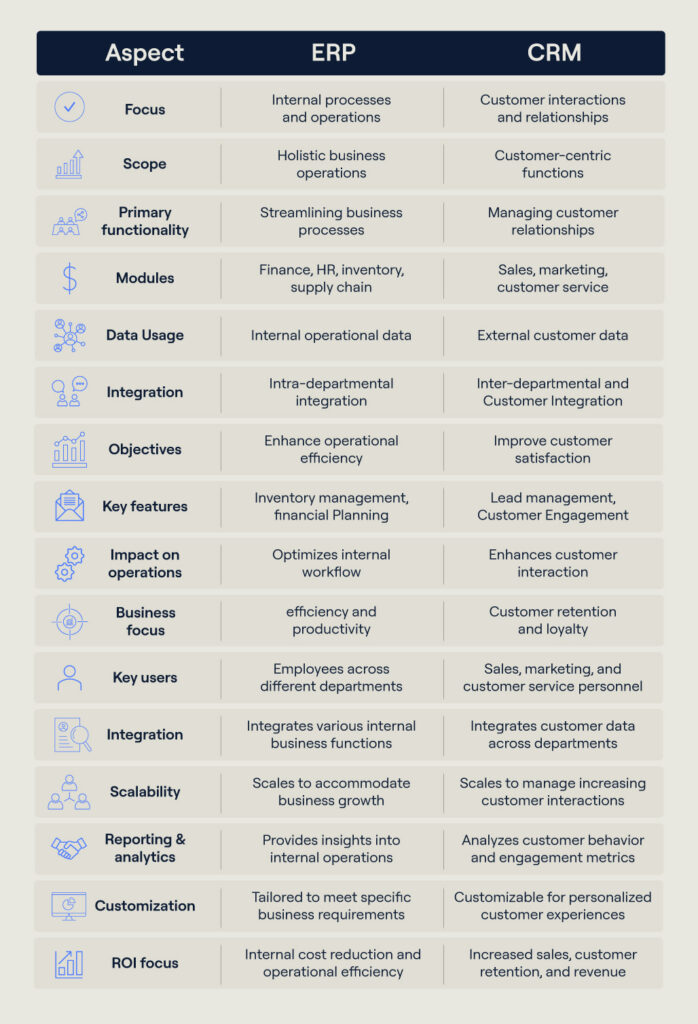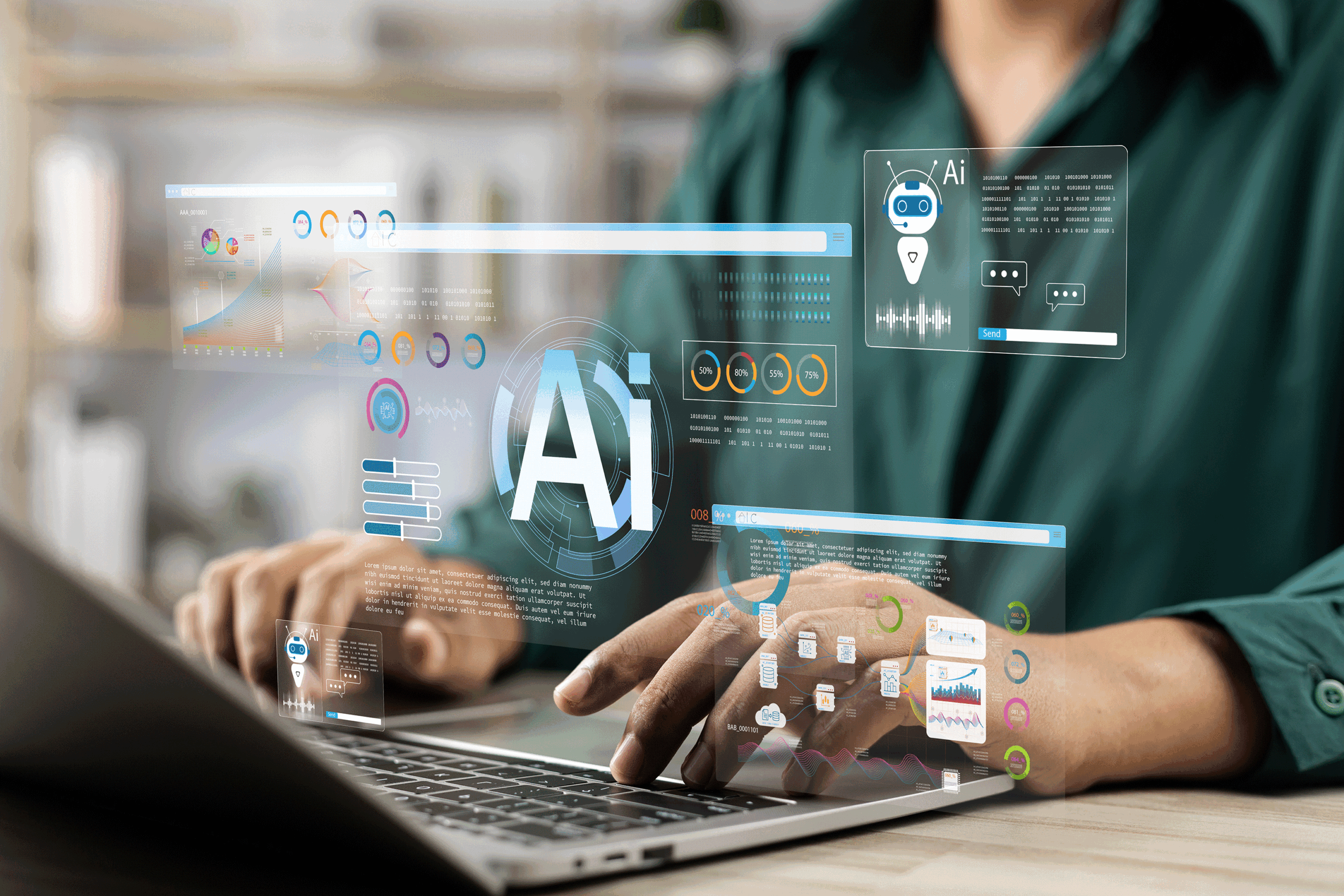What is the difference between an ERP system and a CRM system?
This article aims to decode the complexities of CRM and ERP

The 10-second resume
This article aims to decode the complexities of CRM and ERP, and explore unique features to guide your travel business on when and how to employ ERP and CRM solutions. The article answers questions like:
- What is an ERP system, and how does it work?
- What is a CRM system, and how does work?
- Key difference between CRM and ERP and tips to choose the right ERP and CRM for your travel business.
Learn more about the solutions
Have you ever wondered how successful Travel businesses seamlessly manage their internal processes and customer relationships?
The answer lies in the dynamic duo of ERP (Enterprise Resource Planning) and CRM (Customer Relationship Management) systems.
In the vast landscape of business management, two acronyms you will frequently come across are ERP and CRM. Both are essential tools, each with distinct functions that contribute to organizational success. This article aims to decode the complexities, explore their unique features, and guide travel businesses in making informed decisions on when and how to employ ERP and CRM solutions.
ERP vs CRM
Enterprise Resource Planning system is a comprehensive software solution integrating core business functions to streamline operations by focusing on internal processes, finance management, and optimizing resource utilization. On the other hand, the Customer Relationship Management system focuses on managing customer interaction with clients, fostering relationships, simplifying the sales process, enabling personalized marketing, targeted campaigns, and enhancing customer experiences. The integration of ERP and CRM creates a powerful synergy, providing a holistic view of your business and customers and allowing you to optimize your travel business’ operations to enhance customer satisfaction and achieve sustainable growth.
What is ERP system, and how does it work?
An ERP system will help you manage your travel business’s day-to-day operations. It’s a comprehensive software solution designed to serve as the organizational backbone, streamlining and integrating critical business processes. Its primary purpose is to enhance operational efficiency by providing a centralized platform for managing key functions like finance, human resources, and supply chain. ERP eliminates silos, fostering seamless communication and collaboration across departments. By automating routine tasks, optimizing workflows, and offering real-time insights, ERP empowers businesses to navigate complexities, manage finances, streamline processes, reduce costs, and make informed decisions. The ERP system is also a strategic tool that will ensure that your travel business operates with the agility and effectiveness needed in today’s dynamic and competitive travel landscape.
Key benefits of an ERP system
- Increased efficiency: ERP systems automate many manual tasks, freeing up time for travel agents to focus on providing great customer service.
- Improved accuracy: ERP systems reduce the risk of errors by automating data entry and validation.
- Enhanced visibility: ERP systems provide real-time visibility into all aspects of the travel business, allowing for better decision-making.
- Improved customer service: ERP systems provide travel agents with the information they need to provide personalized and efficient customer service.
- Reduced costs: ERP systems can help travel agencies reduce costs by automating tasks and improving efficiency.
- Enhanced Data Security: ERP systems offer robust data security, a critical advantage in safeguarding sensitive business information.
- Compliance Management: ERP systems assist in compliance with regulations and standards, reducing the risk of legal issues and ensuring adherence to industry requirements.
- Scalability and Flexibility: Modern ERP systems can scale to accommodate the growth of travel agencies, supporting their expanding business needs and evolving requirements.
- Integrated Information: ERP systems integrate information from different departments, fostering better organizational communication and collaboration.
- Competitive Advantage: Utilizing ERP software provides a competitive advantage by optimizing processes, reducing costs, and enhancing overall business performance.
What is a CRM software, and how do travel businesses benefit from it?
A CRM system is more than just a database; it’s a strategic tool enabling travel businesses to personalize their interactions with customers and serves as a centralized hub where all customer-related information is stored. In the dynamic landscape of travel, CRM systems facilitate efficient communication and ensure timely responses and proactive engagement, thereby elevating the overall customer experience.
Why do travel businesses invest in CRM systems?
CRM software serves as the central hub for storing and managing customer data. It provides a holistic view of customer interactions across various channels to help travel businesses better understand customer behavior, preferences, and needs, enabling travel agencies to tailor their offerings and interactions accordingly.
Customer data management forms the bedrock of business success. It ensures that customer information remains accurate, secure, and reliable. By safeguarding the integrity of the data, travel businesses can effectively implement customer loyalty programs, incentivizing repeat purchases and offering unwavering brand loyalty. Additionally, robust customer engagement strategies foster meaningful connections, driving increased interactions and deeper relationships with customers. Moreover, the automation of customer service processes elevates responsiveness, streamlines inquiries, and ultimately enhances overall customer experience. Ultimately, these elements collectively fortify a travel business’s ability to thrive in today’s competitive landscape by putting the customer’s needs front and centre.
Core functionalities of CRM system
CRM systems centralize customer data, enabling efficient management of interactions and relationships. Their core functionalities encompass lead and contact management, tracking communication history, and facilitating personalized marketing campaigns. CRM systems streamline the sales process, offering tools for pipeline management, sales forecasting, and performance analytics. Additionally, CRM platforms enhance customer service with ticketing systems, case management, and service automation, ultimately fostering stronger customer engagement and satisfaction.
Benefits of a CRM system
- Enhanced customer interactions: A CRM system centralizes customer data, enabling travel businesses to better understand client needs. With a comprehensive view of interactions, companies can personalize communication and address customer concerns efficiently.
- Integrated communication: CRM systems facilitate seamless communication within teams. Centralized information ensures that everyone has access to updated customer details, preventing miscommunication and ensuring consistency in client interactions.
- Data-driven insights: CRM platforms generate valuable reports and analytics. These insights provide a clear understanding of customer behavior, enabling businesses to make informed decisions about marketing strategies, product development, and customer engagement.
- Efficient lead management: Efficient lead tracking and nurturing mechanisms within CRM systems help convert leads into loyal customers. Tracking leads through the sales pipeline ensures no potential opportunity is overlooked.
- Forecasting and planning: Access to historical data and forecasting tools empowers businesses to anticipate market trends and customer needs. This foresight aids in proactive planning and strategizing for future growth.
What is difference between CRM and ERP?

Combine ERP and CRM on one common platform for a competitive edge
With one platform to store and provide access to all your organization’s data, your travel business is set for a future where every employee has access to the data they need and where you can act promptly on new ideas and grow your travel business with true insights.
TravelOperations offers the unique opportunity to combine CRM and ERP on one platform (Microsoft Dynamics 365), offering one holistic solution. It’s the end of data silos as you know it, and hello to real insights and streamlined processes across all departments.
BIG Travel enjoys the benefits of one holistic platform
Explore how Big Travel, one of Sweden’s largest TMCs, has paved the way to success with ERP and CRM systems to reshape their operational landscapes, driving unprecedented growth and delivering unparalleled customer experiences.
Discover a real-world example here
How to choose the right ERP and CRM for your travel business?
- Business needs assessment: Evaluate your business requirements and identify specific operational challenges and goals to pinpoint the features and functionalities that are critical to your success. Understanding these needs ensures that the chosen systems align perfectly with your business processes.
- Compatibility and integration: Choose a system that seamlessly integrates with your existing tools and software ecosystem. Compatibility ensures a smooth flow of data and operations across different departments or systems. The ability to integrate facilitates a cohesive workflow, eliminating data silos and enhancing overall efficiency.
- Modification and scalability: Look for systems that offer modification options to tailor the software according to your unique business needs. Scalability is equally vital; the chosen solutions should grow alongside your business, accommodating increased users, data, or functionalities without major disruptions.
- User-friendly interface: Prioritize platforms with intuitive and user-friendly interfaces. A user-friendly design streamlines adoption and usage among employees, reducing training time and ensuring a higher rate of user acceptance.
- Vendor support and reputation: Opt for ERP and CRM providers with a proven track record for reliable support and service. A reputable vendor ensures continuous assistance, timely updates, and effective troubleshooting when needed.
- Cost and ROI analysis: Conduct a comprehensive cost analysis to evaluate the total investment required for implementation, maintenance, and potential upgrades. Assess the expected Return on Investment (ROI) to ensure that the chosen systems offer benefits that justify the costs incurred.
- Data security and compliance: Prioritize systems that prioritize data security and compliance with industry regulations. Robust security measures safeguard sensitive information, protecting it from unauthorized access or breaches while ensuring compliance with relevant data protection laws.
- Mobile access and cloud capabilities: Consider your need for mobile access for increased flexibility and cloud capabilities for scalability. Mobile access enables performing tasks remotely. While cloud features ensure easy updates and reduced infrastructure costs, boosting business agility.
In today’s competitive travel landscape, organizations that effectively manage their internal operations and customer relationships are more likely to succeed. By leveraging the power of ERP and CRM systems, your business can gain a significant advantage and achieve your strategic goals.
Eager to elevate your business standards?
Discover the capabilities offered by TravelOperations — an unparalleled companion for navigating the complexities of ERP and CRM, serving as your business’s steadfast partner.
Looking for more inspiration?
Discover articles, guides, and customer stories
-

How to calculate the ROI of ERP?
Learn how to measure the return on investment on ERP systems (ROI) by comparing various costs against the financial and operational benefits gained.
-

How do corporate travel policies help reduce the carbon footprint?
Corporate travel policies help companies align with environmental goals while maintaining efficiency and responsibility.
-

How does AI eliminate 7 common challenges in finance?
This article explores seven key finance challenges and how AI can help solve them.